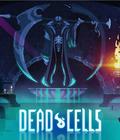In some ways, Dead Cells sounds like a joke. It's a randomly generated Metroidvania-style indie rogue-like with elements of Dark Souls. It sounds like half of the pitches on Kickstarter, but sounding like a cliché doesn't make it one. Dead Cells hits all of these fan favorite buzzwords, but it feels like an attempt to meld all of the ideas. It's a little Rogue Legacy and a little Castlevania, and the result is something that's a lot of fun, at least in its current Early Access state.
Dead Cells is a pretty simple idea. You play as a bundle of, well, dead cells that glop themselves into inhabiting a dead body. From there, they venture through a long and complex dungeon seeking to find out what they are and how they got there. You'll get snippets and hints of a plot, but in its current state, it's largely there for flavor, not cut scenes. This is good, as Dead Cells is the kind of game that hits the ground running and doesn't stop.
Dead Cells is going to be compared to Rogue Legacy because they're fairly similar on the surface. Punishing 2-D platformers expecting you to venture through dungeons and die over and over, but Dead Cells is structured a little differently. Rather than a large castle, you run through smaller zones that are somewhat non-linear. There are teleporters between locations, but once you exit one area, you can't go back. Dead Cells is much faster paced, with speedier movement, fewer floaty jumps, and more complex combat mechanics. They're different beasts despite any surface similarities.
By default, you're able to hold two weapons at once; they're your main method of attack and can vary wildly. Swords are all-around weapons. Shields let you parry and block attacks. Bows and daggers allow you to attack from a distance but have a limited ammo supply. You can swap between new weapons as you find them. More powerful versions of weapons with special abilities can be found throughout the dungeons, some with special abilities. For example, I found an electric whip that did more damage at full health and another that generated parasitic monsters that attacked nearby enemies.
In addition, you can get sub-weapons that include bear traps, grenades and turrets. The weapons function on cooldowns, which means they're accessible but can't be spammed. Subweapons can also have special abilities. I had a grenade that would do more damage to poisoned enemies. The weapons are important because they let you cover areas that your regular weapons can't reach and give you more options.
The largest "downside" in our preview build of Dead Cells is that the tools are currently too powerful. Several weapons, like the throwing daggers and electric whip, are absurdly strong in addition to having huge distance and a long range. This is supposed to be balanced by some limitations, like daggers having limited ammo, but by and large, the limitations are not restrictive enough to make up for their strength. It's a relatively minor flaw that can be balanced before the game leaves Early Access.
As with Rogue Legacy and similar games, Dead Cells is a mix of restarting and permanent progression. Killing enemies unlocks cells, which can be spent to unlock new abilities or permanent character upgrades, such as an Estus-like healing flask or the ability to keep some gold between runs. Upgrades begin cheap and get more expensive, but you can purchase them over time by investing cells in them. You spend cells between areas — you must spend them before you can advance to the next area — so you'll consistently make progress over time. You can also find blueprints that unlock new potential upgrades, but only if you make it through a level with them.
You can unlock Metroid-style movement and mobility options. The upgrades allow you to take shortcuts, which let you get through earlier areas of the game faster. One of the first lets you turn slime molds into climbable vines, so you can access normally inaccessible areas or find new paths. This upgrade remains throughout your many deaths, so even though you're going through the earlier areas, you may not have the same experience. There are other upgrades that allow you to access hidden areas or special secrets. The basic weapon upgrades feel good, but mobility upgrades are where Dead Cells shines. A damage bonus is nice, but shortcuts are even nicer.
On the other hand, you will lose things when you die. There are temporary power-ups that increase your weapon strength, health or special abilities, which only last until your unfortunate death. It's slightly more accessible than Rogue Legacy in that you're always advancing through the levels, so you have more time to power up instead of rushing for the hardest area you can. Despite the high power of weapons in the current build, you'll still be punished for lazy play. Even the simplest zombie can do tons of damage if they hit you, and later areas have more complex enemy patterns and more difficult foes. The nastiest are the elite foes, who have abilities like teleportation and damage reduction. Mess up against those, and be prepared to lose everything you've got.
While you're encouraged to be careful, an interesting element of Dead Cells is that successive playthroughs gradually want you to go faster. The unlocked mobility options are part of this, but the game also has timed doors. If you're too slow getting through levels, certain areas are inaccessible. Nothing is quite so frustrating as reaching a door only for it to remain closed and tell you that it was sealed 30 seconds ago. These areas are optional from what we've seen, but it forces you to balance exploring each area with being quick enough to not fall behind in later areas. Each successive upgrade makes it easier to go faster, but if you rush, you might not have the health to survive a later area.
All in all, Dead Cells, is off to a very good start. It might sound like an indie game cliché, but the execution is top-notch. The visuals, gameplay and mechanics come together remarkably well. It's obviously inspired by other games, but it's a lot of fun to play. If the final version of the game lives up to the strong showing in its Early Access iteration, then Dead Cells will be a must-buy. Even now, in its partially finished state, Dead Cells is one of the most enjoyable titles that I've played in the genre.
More articles about Dead Cells











 Dead Cells is a roguelike, Castlevania-inspired action-platformer, allowing you to explore a sprawling, ever-changing castle… assuming you're able to fight your way past its keepers.
Dead Cells is a roguelike, Castlevania-inspired action-platformer, allowing you to explore a sprawling, ever-changing castle… assuming you're able to fight your way past its keepers.




